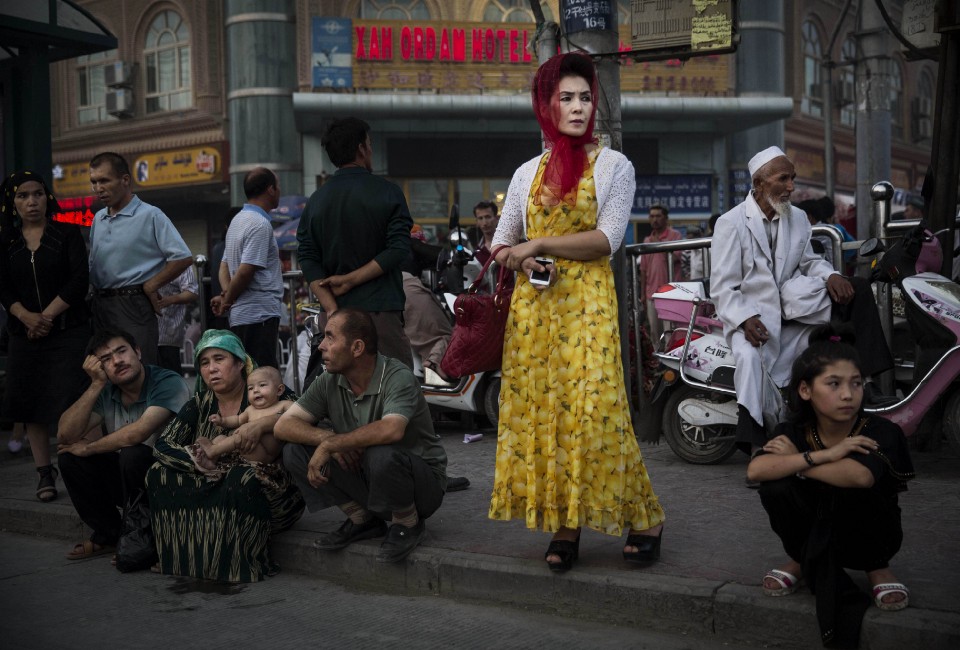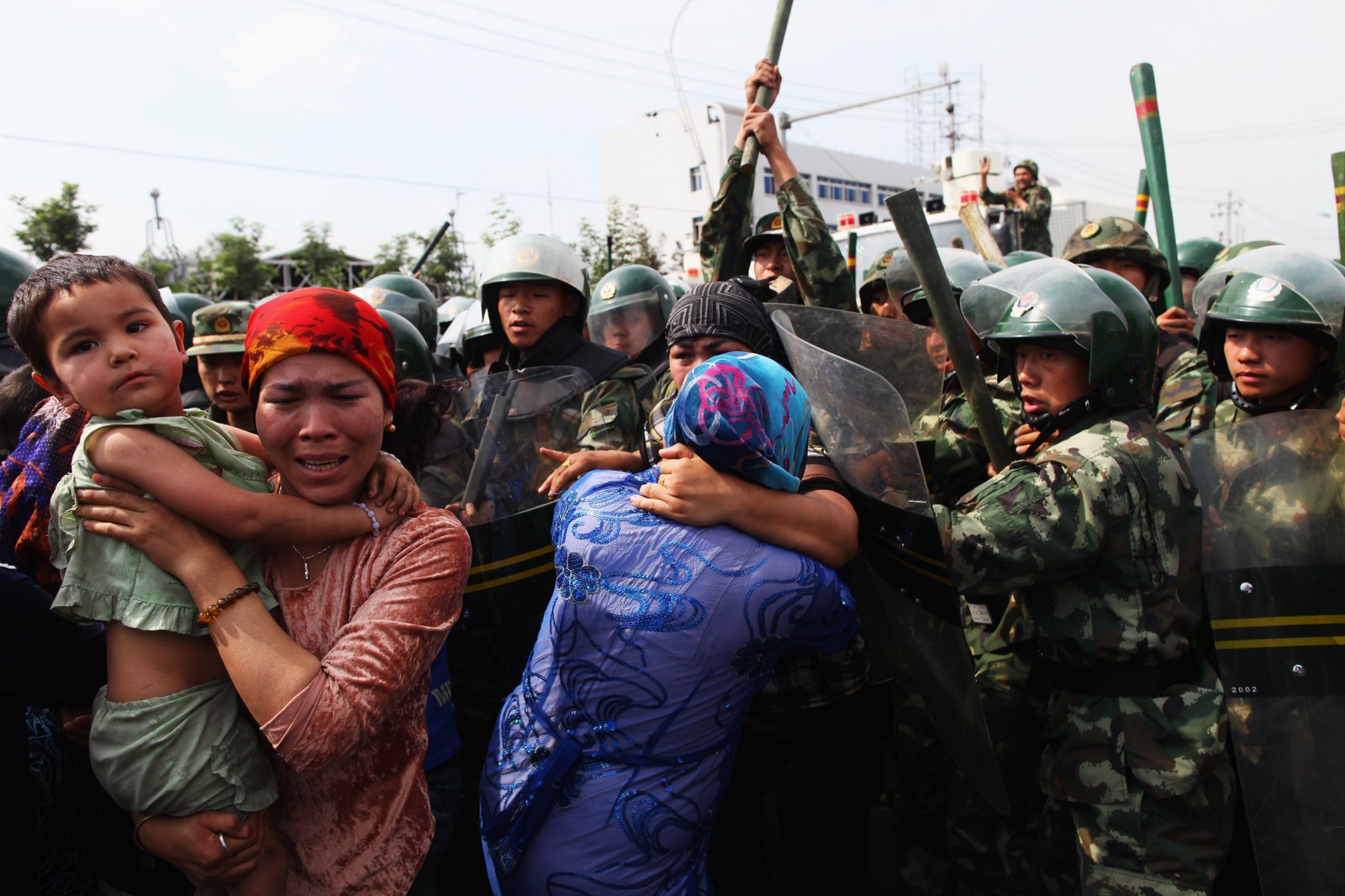A scholar suggests Beijing is heightening its suppression of the Uyghur ethnic minority.
By Massoud Hayoun
Chinese soldiers march past the Id Kah Mosque, China’s largest, on July 31st, 2014, in Kashgar, China. (Photo: Getty Images)
China has, in recent years, embarked on a far-reaching, oft-chimerical quest to pacify its restive far-Western region of Xinjiang, home to the predominantly Muslim ethnic Uyghurs. And now Beijing is busily building a “security state” in the region, according to one scholar on Uyghur affairs.
This month, amid reports of heightened violence in Xinjiang, China’s push has seen tightened controls on movement and prompted a large, showy state-sponsored police demonstration against terror in Xinjiang’s regional capital. These moves come during what has been reported in international media as an uptick in violence between Uyghurs and majority Han — one that is shrouded in mystery, simply because the international press faces overwhelming restrictions reporting there.
In what had been described as part of a national program, officials from the Xinjiang prefecture of Bayingolin have ordered that vehicles in the area have GPS tracking devices installed as a means of ensuring national security, the United States’ Radio Free Asia reported Monday. In a separate incident last week, thousands of law enforcement officers conducted the latest in a series of rallies pledging to combat terrorism in the regional capital of Urumqi, China’s Global Times reported.
“Recent events are suggesting that the Chinese state is creating a security state within Xinjiang like never seen before,” says Sean Roberts, a scholar on Uyghur and Asian affairs and director of George Washington University’s International Development Studies Program. Roberts is the author of a forthcoming book on the Uyghurs, Self-Fulfilling Prophecy: How the Global War on Terror and China Created Uyghur Terrorism.
“In [creating a security state, Chinese authorities] are taking full advantage of the new technologies that allow states to control their populations — they are making residents install tracking devices in vehicles, they are randomly searching cell phones of Uyghurs without probable cause, they are using public surveillance cameras and biometrics,” Roberts says. “In general, it is a frightening experiment that could spread to elsewhere where authoritarian states seek to fully control the lives of their citizens.”
Uyghur rights advocates condemned both the news on the GPS tracking and the law enforcement rally.
“The overt exploitation of an ostensibly precarious security situation to broaden an already well-entrenched web of surveillance architecture in the region is clear to see here from the government,” says Peter Irwin, project manager with the World Uyghur Congress, a group that aims to represent the interest of Uyghurs internationally. Together with other Uyghur rights groups, the WUC is alleged by the Chinese government to promote violence and separatism in Xinjiang.

Uyghurs wait at a bus stop on July 27th, 2014, in old Kashgar, Xinjiang Uyghur Autonomous Region, China. (Photo: Kevin Frayer/Getty Images)
“The recent mass rallies are counter-productive—forced participation has no buy in,” says Henryk Szadziewski, senior researcher at the Washington, D.C.-based advocacy group Uyghur Human Rights Project. “The pervasive nature of surveillance in Xinjiang has become a daily reality for many Uyghurs. China has stepped up its technological approach to keep tabs on the people in the region. GPS tracking of cars, real name registration, and onerous Internet restrictions are elements in this augmented surveillance.”
The effectiveness of this surveillance remains dubious, Szadziewski says. “There is no evidence that points to how these measures and laws protect Uyghurs and improve their lives.”
In September of 2013, China signed a series of agreements with Central Asian energy exporters like Kazakhstan that border Xinjiang to the West that would funnel oil and gas directly into the region. In the following months and years, Beijing embarked on a heightened push to pacify Uyghur uprisings.
That push has occasionally bordered on the surreal. In August of 2014, the government sponsored a cartoon called Princess Fragrant that portrayed the story of a Uyghur imperial consort of the ethnic Manchu Qing Dynasty emperor. Uyghur rights advocates told international media that the cartoon was a poor attempt to whitewash over years of violent suppression. Also in 2014, the government embarked on a bid to pay Xinjiang residents who informed authorities of neighbors who seemed to be keeping beards — considered to be a sign of Islamic faith; analysts said that bid aimed to acculturate Uyghurs and alienate them from their faith.
“The pervasive nature of surveillance in Xinjiang has become a daily reality for many Uyghurs. China has stepped up its approach to keep tabs on the people in the region.”
But Uyghur lives have also been lost or otherwise upended in China’s push to re-assert control in Xinjiang. The attempt to quell Uyghur unrest has led to ongoing reports — often from Radio Free Asia or Chinese state media— of extrajudicial killings of suspected Uyghur separatists.
A case that garnered international attention was that of Ilham Tohti, who had been a Uyghur economics professor at one of China’s top universities, Renmin University. Tohti had run a website uighurbiz.net that reported the religious and socioeconomic repression of Uyghurs. It offered a rare insight into the situation on the ground in one of the most restrictive media environments in China — and, indeed, the world.
At the time, Tohti spoke on several occasions with Pacific Standard’s reporter. He never advocated for Xinjiang separatism in those interviews, but rather expressed that Uyghurs suffer many of the same incursions on civil liberties as their Han counterparts and other Chinese ethnic minorities. On September 23rd, 2014, a Chinese court sentenced Tohti to life in prison on charges of inciting separatism that international rights groups like Amnesty International have said were trumped up in order to silence a prominent voice on Uyghur rights.
Tohti’s daughter, Jewher Ilham, who is a student at Indiana University, tells Pacific Standard by phone that her “family is allowed to send him some money once [every] couple of months to the prison, so he can use the money to order food from outside.”
“That’s all I know,” she adds.

Chinese policemen push Uyghur women who are protesting at a street on July 7th, 2009, in Urumqi. (Photo: Guang Niu/Getty Images)
Tohti’s removal from the international conversation on Uyghurs is felt far beyond the confines of his family.
“The absence of Professor Tohti has dealt a significant blow for our understanding of the relationship between the Chinese government and the Uyghur population,” WUR’s Irwin says. “Tohti was such a well-respected voice on the issue, particularity his understanding of the importance of bringing people together while the state continued its efforts at driving a wedge between people with much more in common than is often suggested.”
Chinese media have reported a series of national security incidents in recent years that it has attributed to Uyghurs. In one high-profile example in late October of 2013, a car rammed into a crowd at Tiananmen Square, killing five. This and other such attacks were attributed to Uyghur assailants, but authorities tightened control of the scenes of the attacks — often mounting physical barriers to keep observers from reporting details, prompting rights organizations to decry a lack of transparency into Beijing’s handling of these incidents and its accounts of perpetrators.
Some scholars of Uyghur affairs argue that China’s suppression of Uyghurs helped precipitate the existing security threats.
GWU’s Roberts says that, since 2009, when deadly riots resulted in increased suppression of Uyghurs, many left the country. “While most of these Uyghurs, who leave with their entire families, are seeking refuge in Turkey, a substantial number of them have also been recruited and radicalized by extremist groups fighting in Syria,” Roberts says.
“As a result, China’s pressure on the Uyghurs is essentially leading to many Uyghurs becoming more militant, which, of course, leads to more pressure from the state on Uyghurs,” Roberts says. “It is a vicious circle, which has made Xinjiang into a virtual security state where surveillance and the repression of independent thought is far more draconian than elsewhere in the People’s Republic.”
China has, in recent months, been internationalizing its foray into its own take on a global war on terror. In October, Beijing conducted its first-ever counterterrorism drills with Saudi Arabia in the southern Chinese city of Chongqing. The drills were received in international media as an effort to garner Muslim-world support for its bid to address security issues involving Uyghurs.





